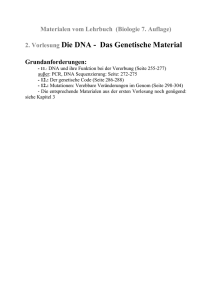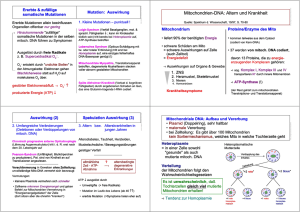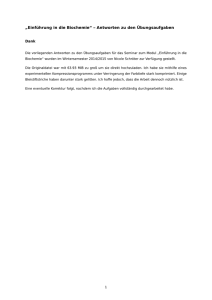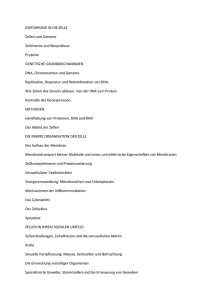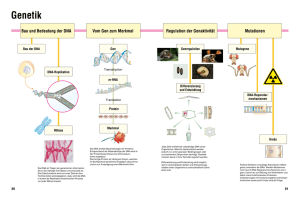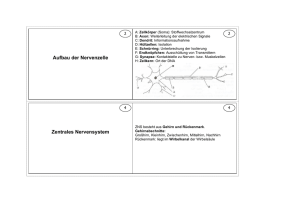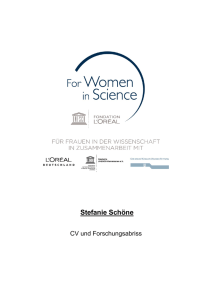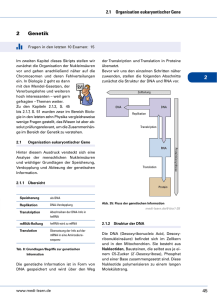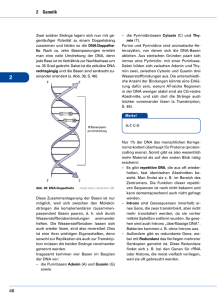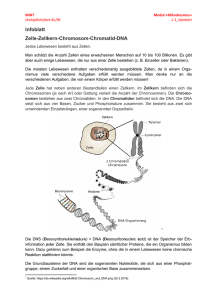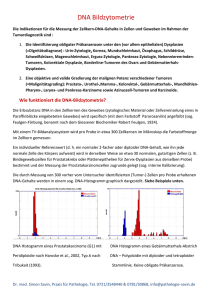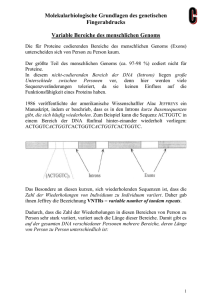Nach Microsoft Word exportieren
Werbung
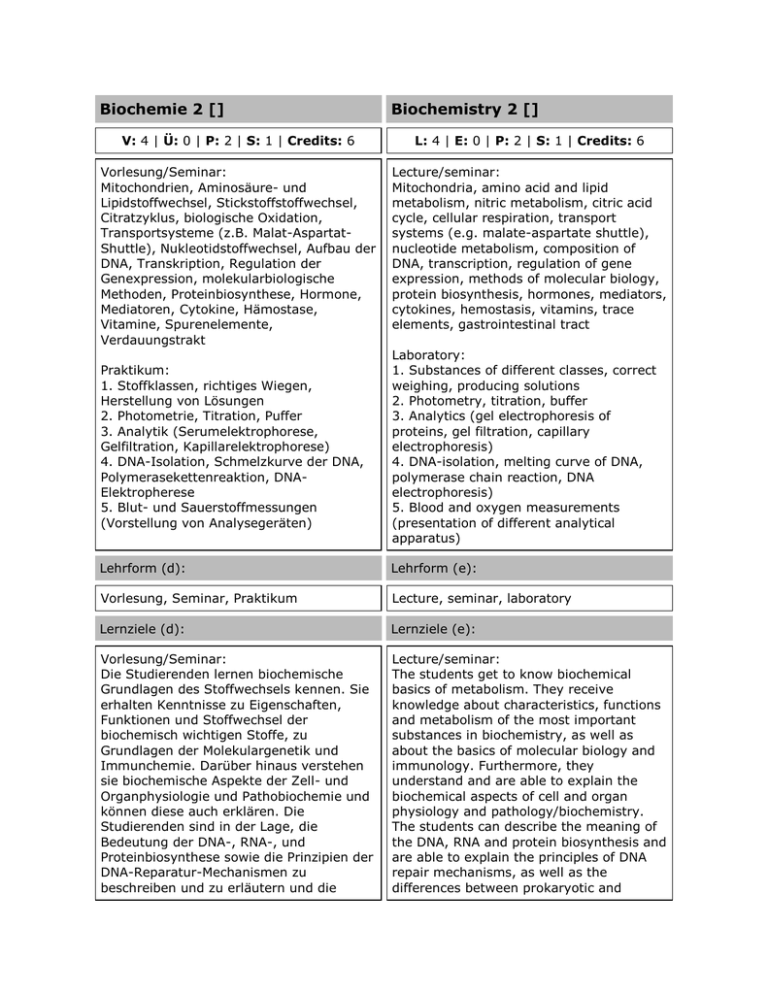
Biochemie 2 [] Biochemistry 2 [] V: 4 | Ü: 0 | P: 2 | S: 1 | Credits: 6 L: 4 | E: 0 | P: 2 | S: 1 | Credits: 6 Vorlesung/Seminar: Mitochondrien, Aminosäure- und Lipidstoffwechsel, Stickstoffstoffwechsel, Citratzyklus, biologische Oxidation, Transportsysteme (z.B. Malat-AspartatShuttle), Nukleotidstoffwechsel, Aufbau der DNA, Transkription, Regulation der Genexpression, molekularbiologische Methoden, Proteinbiosynthese, Hormone, Mediatoren, Cytokine, Hämostase, Vitamine, Spurenelemente, Verdauungstrakt Lecture/seminar: Mitochondria, amino acid and lipid metabolism, nitric metabolism, citric acid cycle, cellular respiration, transport systems (e.g. malate-aspartate shuttle), nucleotide metabolism, composition of DNA, transcription, regulation of gene expression, methods of molecular biology, protein biosynthesis, hormones, mediators, cytokines, hemostasis, vitamins, trace elements, gastrointestinal tract Praktikum: 1. Stoffklassen, richtiges Wiegen, Herstellung von Lösungen 2. Photometrie, Titration, Puffer 3. Analytik (Serumelektrophorese, Gelfiltration, Kapillarelektrophorese) 4. DNA-Isolation, Schmelzkurve der DNA, Polymerasekettenreaktion, DNAElektropherese 5. Blut- und Sauerstoffmessungen (Vorstellung von Analysegeräten) Laboratory: 1. Substances of different classes, correct weighing, producing solutions 2. Photometry, titration, buffer 3. Analytics (gel electrophoresis of proteins, gel filtration, capillary electrophoresis) 4. DNA-isolation, melting curve of DNA, polymerase chain reaction, DNA electrophoresis) 5. Blood and oxygen measurements (presentation of different analytical apparatus) Lehrform (d): Lehrform (e): Vorlesung, Seminar, Praktikum Lecture, seminar, laboratory Lernziele (d): Lernziele (e): Vorlesung/Seminar: Die Studierenden lernen biochemische Grundlagen des Stoffwechsels kennen. Sie erhalten Kenntnisse zu Eigenschaften, Funktionen und Stoffwechsel der biochemisch wichtigen Stoffe, zu Grundlagen der Molekulargenetik und Immunchemie. Darüber hinaus verstehen sie biochemische Aspekte der Zell- und Organphysiologie und Pathobiochemie und können diese auch erklären. Die Studierenden sind in der Lage, die Bedeutung der DNA-, RNA-, und Proteinbiosynthese sowie die Prinzipien der DNA-Reparatur-Mechanismen zu beschreiben und zu erläutern und die Lecture/seminar: The students get to know biochemical basics of metabolism. They receive knowledge about characteristics, functions and metabolism of the most important substances in biochemistry, as well as about the basics of molecular biology and immunology. Furthermore, they understand and are able to explain the biochemical aspects of cell and organ physiology and pathology/biochemistry. The students can describe the meaning of the DNA, RNA and protein biosynthesis and are able to explain the principles of DNA repair mechanisms, as well as the differences between prokaryotic and Unterschiede zwischen prokaryontischer und eukaryontischer Genregulation zu erklären. Praktikum: Die Studierenden erlernen grundlegende biochemische Arbeitsmethoden und sind in der Lage, theoretische Konzepte auf der Basis einfacher Versuchsvorschriften in ein Experiment umzusetzen. Das Praktikum vermittelt zu dem den Umgang mit verschiedenen Labor- und Analysengeräten und erläutert die Grundlagen, wie biochemische Fragestellungen experimentell gelöst werden können. eukaryotic gene regulation. Laboratory: The students learn basic biochemical operating procedures and are able to move theoretical concepts on the base of easy test protocols in an experiment. The practical course provides the contact with different lab and analyses devices and explains the basics how biochemical questions can be solved experimentally. Studienleistung (d): Studienleistung (e): Klausur (45 Min.) Written exam (45 min.) Dozenten: Sprache: KapVO: Literatur: zug. Modul: zug. Studiengänge: Prof. Dr. med. Herbert de Groot deutsch 0 Skript zur Vorlesung; Praktikumsskript; Berg JM, Tymoczko JL, Stryer L. Stryer Biochemie. 7. Auflage, Verlag: Springer Spektrum; Nelson D, Cox M. Lehninger Biochemie. 4. Auflage, Verlag: Springer; Heinrich PC, Müller M, Graeve L. Löffler/Petrides Biochemie und Pathobiochemie. 9. Auflage, Verlag: Springer; Rassow J, Deutzmann R, Metzger R, Hauser K. Duale Reihe Biochemie. 3. Auflage, Verlag: Thieme Medizinbereich (Medical) Bachelor Medizintechnik PO15 (3. Semester)
